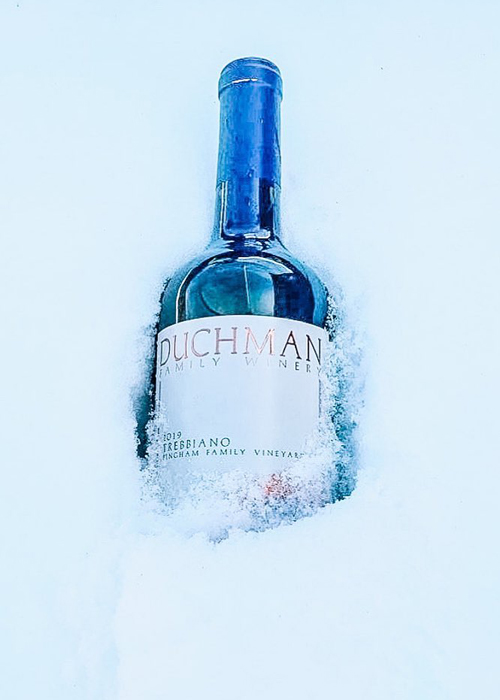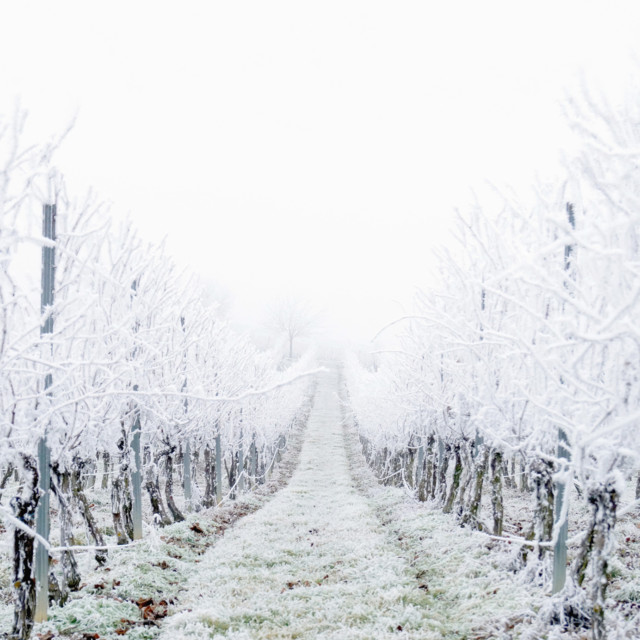It’s too early to know the impact February’s massive Texas storm will have on the state’s wine industry. The first clues will likely emerge at the beginning of springtime, when the vines come out of their dormant period and bud break occurs. Hopefully, the damage will prove minimal to non-existent. But if there is some harm, it won’t be anything that Texas wine producers haven’t seen before.
Dealing with bursts of severe weather is an annual affair for Texas wineries, to the point where they almost are a rite of passage among wine growers. “If you grow grapes in Texas, you get used to having to find creative ways to deal with what Mother Nature gives you every year,” says Ron Yates, owner of Spicewood Vineyards in Spicewood, Texas. “You always have to be ready to pivot.”
At their worst, these disruptions are substantial. Warm, pleasant days can suddenly give way to sharp punches of sub-freezing temperatures and hailstones in the middle of a wine’s growing season, including temperatures that can dip into the teens. These conditions are especially brutal in Texas because of the types of grapes grown there. Unlike some wine regions that grow grapes that can withstand frigid temperatures, like New York’s Finger Lakes appellation, the heat that bakes Texas terroir in the prime of growing season is best suited for warm-climate grapes like Rhône- and Mediterranean-style varietals, making them more vulnerable when freezing temperatures hit.
The results are swift and powerful — one or two hours of an ill-timed blast of this extreme cold can freeze vines and potentially ruin a crop. Excess freezing can limit yields, truncate distribution, and disrupt hard-earned market placement. Some years slip by without this level of meteorological wrath. Others do not; the four separate freezes that besieged the 2013 vintage make that year a particularly unpleasant memory for veteran Texas vintners.
The yearly threat of significant weather-based damage, including the times when the threats weren’t merely idle ones, made it easier for Texas wine industry veterans to roll with the storm’s punches as it waylaid the state. It’s also made some of them somewhat philosophical. “Texas weather is Texas weather,” explains Julie Kuhlkan, co-founder and chief marketing and hospitality officer of Pedernales Cellars in Stonewall. “Every year is a different adventure. The best you can do is react to the adventure appropriately.”

An Important Year
The mood is cautiously optimistic among the cluster of wineries found in Texas Hill Country, the industry’s epicenter located some 90 minutes west of Austin. This may sound surprising at first. After all, freezing temperatures rocked the region and pounded the Texas High Plains appellation in the state’s panhandle, home to roughly 80 percent of Texas’s vines. Yet the collective disposition is justifiable. As morbid as it may sound, the storm’s timing was oddly perfect for the industry. It landed when the vines were dormant, and their inactivity provided them natural protection from the elements. Had the storm landed in the spring through the fall when the vines are awake and thriving, the mood would likely be much more dour.
This sense of optimism is important, if not necessary. After a robust 2019 vintage that produced an abundance of terrific fruit, 2020’s vintage endured a fall freeze that hammered the vines in the middle of harvest and sharply reduced winery yields by 40 to 60 percent, even with protective measures like inversion sink fans and ready-to-burn hay bales in place. The wineries tapped their reserve fruit from the previous year’s harvest to mitigate the loss, but they’ve arrived at an impasse that makes nurturing the vines as they re-awaken crucial. “2019 helped us to start closing 2020’s gap, but their fruit can only do so much,” Kuhlken says. “We need 2021 to succeed, and we’ll be working hard to make sure the vintage bridges the rest of 2020’s trough.”
Some of these efforts may be collaborative. It’s not uncommon for Texas wineries to grant access to vineyards or fruit surpluses to other vintners in the wake of a rough harvest. “The only competition Texas wineries are ever engaged in with each other is the friendly kind,” says Yates. “I can’t ever think of a time when everyone wasn’t helping everyone else to succeed.” If the need for assistance does arise, one thing the wineries won’t be doing is to seek help outside the Lone Star State. “We could make things easy for ourselves and buy grapes from California if we wanted to, and we’ve had offers to do so, but we can’t go that route,” explains Tommy Wellford, general manager of Duchman Family Winery in Driftwood. “Texas is religion to some of our customers. They appreciate that our use of 100 percent Texas grapes is part of our story.”
Pandemic and Preparedness
Just how bad was the storm? “You almost forgot you were also in a pandemic,” Kuhlken says.
Covid-19 is indeed still affecting Americans’ day-to-day lives despite the vaccination rollout, and Texas wineries are still immersed in the reality of the state’s reduced-capacity regulations as they deal with the aftermath of power outages and frozen pipes. Yet from an operational standpoint, the hoops they’ve had to jump through during the pandemic may have helped them ride the storm out. “I don’t think we would have been as prepared for the storm as we were without Covid,” Kuhlkan says. “We’ve never seen as many wrenches thrown into the system as we have during the last 12 months, and all of the pivoting we needed to do has made us more resilient.”
This sense of resiliency may remain intact long after accounts of the storm and the virus share space in the state’s history books. If it does, it will certainly prepare them for the next weather-related event, whenever that may come. “You never know what may be in store down the road,” Yates says. “Things could be fine for a while, or you could get hit with a freeze because of a freak ice storm in early June. But that’s winemaking in the great state of Texas.”
This story is a part of VP Pro, our free platform and newsletter for drinks industry professionals, covering wine, beer, liquor, and beyond. Sign up for VP Pro now!
